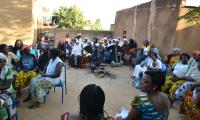National human rights institutions are vital to post-2015 development agenda

In September 2015, the UN will set the course for the international development for the next 15 years, when the General Assembly adopts the Sustainable Development Goals (SDGs).
For those goals to be succesful, national human rights institutions need to play a crucial role in monitoring progress by states regarding fulfilment of the goals. That is the conclusion in a new briefing paper from the Danish Institute for Human Rights and the Center for Economic and Social Rights.
The SDGs consist of 17 goals that are to be universally applied. While human rights are not often specifically mentioned, human rights will still be key to the fulfilment, according to Allan Lerberg Jørgensen, director for the Human Rights and Development department at the Danish Institute for Human Rights:
"The make or break issue for the SDGs will be implementation at the national level. We need the right type of institutions to secure participation, monitoring and accountability in the implementation process. National human rights institutions can play a critical role in that regard, so it is important to secure their engagement from the outset," Allan Lerberg Jørgensen says.
Inequality and discrimination
National human rights institutions, including ombudsmen, equality bodies and others, have a unique oppurtunity to guide the SDG processes in terms of promoting rights-compliant national implementation plans, monitoring progress from a human rights perspective, paying particular attention to inequality and discrimination, and ensuring accountability and access to justice for development-related human rights violations.
"National human rights institutions have a crucial role to play in ensuring that all governments – and not just those of the so-called developing world – are accountable to the international commitments reflected in the SDGs,” said Center for Economic and Social Rights' Executive Director, Ignacio Saiz.
“But to fulfil that potential, many will need to strengthen their commitment and capacity to monitor economic, social and cultural rights, and to engage more meaningfully in development policy.”
